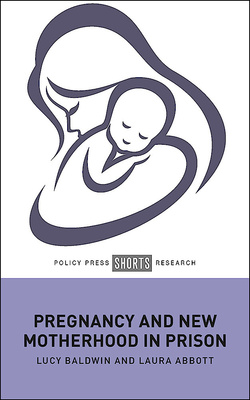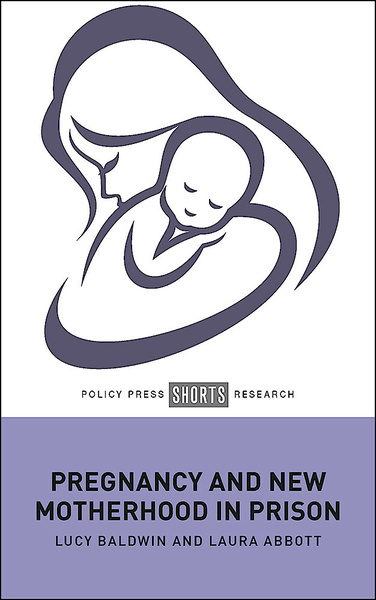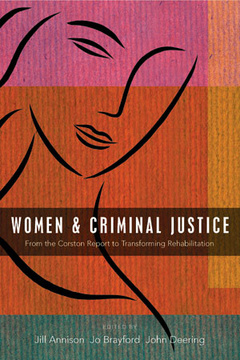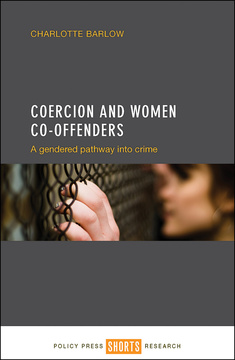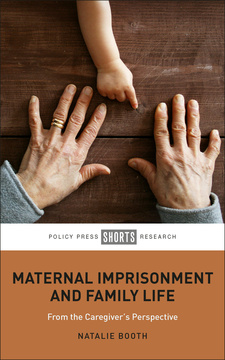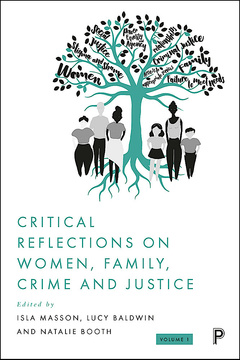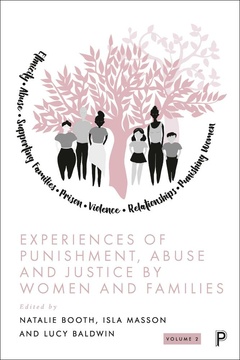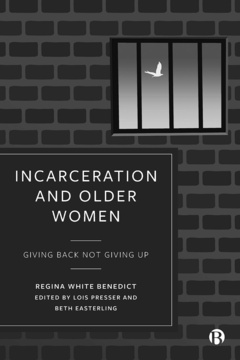Pregnancy and New Motherhood in Prison
By Lucy Baldwin and Laura Abbott
Published
Nov 30, 2023Page count
208 pagesISBN
978-1447363385Dimensions
203 x 127 mmImprint
Policy PressPublished
Nov 30, 2023Page count
208 pagesISBN
978-1447363392Dimensions
203 x 127 mmImprint
Policy PressPublished
Nov 30, 2023Page count
208 pagesISBN
978-1447363392Dimensions
203 x 127 mmImprint
Policy PressIncorporating the authentic voices and real-life experiences of women, this ground-breaking book focuses on pregnancy and new motherhood in UK prisons. The book delves critically and poignantly into the criminal justice system's response to pregnant and new mothers, shedding light on the tragedies of stillborn babies and the deaths of traumatised mothers in prison.
Based on lived realities, it passionately argues the case for enhancing the experiences of pregnant and new mothers involved with the criminal justice system. Aiming to catalyse policy and practice, the book is key reading for criminology and midwifery students and researchers as well as policy makers and practitioners.
“This sensitively written and extremely powerful book opens the door for us to understand the harrowing experiences of new mothers and pregnant women in prison, answering the question of how we got here, and offering recommendations so that history does not repeat any longer.” Nicola Harding, Lancaster University
Dr Lucy Baldwin is widely regarded as a national expert in relation to Maternal Imprisonment, and criminalised motherhood. Her work has influenced and continues to influence, policy and practice nationally and internationally. She recently retired as an Associate Professor at Durham University, however, she remains an associate Research Fellow with Durham, whilst also remaining a committed feminist criminal justice researcher, consultant, activist, and expert witness. Lucy has over 35 years of experience working in and around social and criminal justice; she is a qualified and experienced social worker and probation officer. Lucy has provided oral and written evidence which helped to inform the Female Offender strategy, the Farmer Review for Women, and the Joint Human Rights Parliamentary Inquiry into Maternal Imprisonment and the Rights of the Child. Lucy's work has been described as 'having real-world value and impact'. Working closely with Sodexo, she has produced a 'Motherhood Charter', which provides a set of standards for custodians of incarcerated mothers to aim for, adhere to, and be measured against. It is hoped the Motherhood Charter will eventually be rolled out nationally. Lucy regularly designs and delivers programs for Criminal Justice practitioners in the areas of motherhood, pregnancy and prison and has designed tools and guidance for all probation officers, accessible via the National Probation Service intranet. Her groundbreaking book 'Mothering Justice', published in 2015, was the first book in the UK to focus solely on criminalised motherhood. Similarly, this publication, 'Pregnancy and New Motherhood in Prison’ is the first book in the UK to focus on the needs and experiences of pregnant women in prison. Lucy remains active and passionate in her pursuit of positive change, support, and reform for women affected by criminal justice, and is committed to ensuring women with criminal justice lived experience are empowered and heard.
Dr Laura Abbott is a highly accomplished researcher and midwifery practitioner specialising in the field of pregnancy and new motherhood in prison. Currently holding the position of Associate Professor in Research at The University of Hertfordshire, Laura is recognised as a Registered Midwife, a Senior Fellow of the Higher Education Academy, and a Fellow of the Royal College of Midwives. Her innovative doctoral work, titled "The Incarcerated Pregnancy: An Ethnographic Study of Perinatal Women in English Prisons," explored the experiences of pregnant women in prison, providing valuable insights into this underexplored area. Laura's contributions extend beyond academia. She co-authored "The Birth Charter" for pregnant women in England and Wales, a significant publication by Birth Companions in May 2016. This publication highlights her dedication to advocating for the rights of pregnant women. Her expertise has also helped shape the operational policy of Her Majesty's Prison and Probation Services regarding pregnancy, Mother and Baby Units (MBUs), and maternal separation in prison. Laura has also provided evidence at the parliamentary Joint Human Rights Committee, showcasing her influence in improving the care and support for incarcerated pregnant women and new mothers. Laura's commitment to international collaboration and advocacy is evident through her co-founding of the Pregnancy in Prison Partnership International (PIPPI), where she collaborates with academics from Australia, New Zealand, Canada, Japan, the USA, and the UK. Additionally, she played a pivotal role in establishing the UK-wide Prison Midwives Support Group. Laura leads as the Principal Investigator for ‘The Lost Mothers Project’, a significant initiative in collaboration with Birth Companions and their Lived Experience Team, which is funded by the ESRC. The project focuses on examining the experiences of enforced separation from newborn babies, shedding light on the profound impact it has on both mothers within the criminal justice system and the perspectives of health, social, and prison professionals involved. Laura's dedication to improving knowledge, policy, and support systems for pregnant women and new mothers in prison remains a driving force in her work and research endeavours.
Chapter 1. Context and Landscape of Pregnancy and New Motherhood in Prison
Chapter 2. How We Came To Be Here: 100 Years of Criminalised Motherhood
Chapter 3. The ‘Journey’ to Incarcerated Motherhood
Chapter 4. Motherhood Confined
Chapter 5. The Persisting Pain of Incarcerated Pregnancy and New Motherhood
Chapter 6. Personal Experiences of Pregnancy and Motherhood in Prison and the Value of the Voluntary Sector in Challenging the System By Samantha Harkness, Michelle Wright and Kirsty Kitchen
Chapter 7. ‘Learning Lessons’: Discussion, Concluding Thoughts and Recommendations







